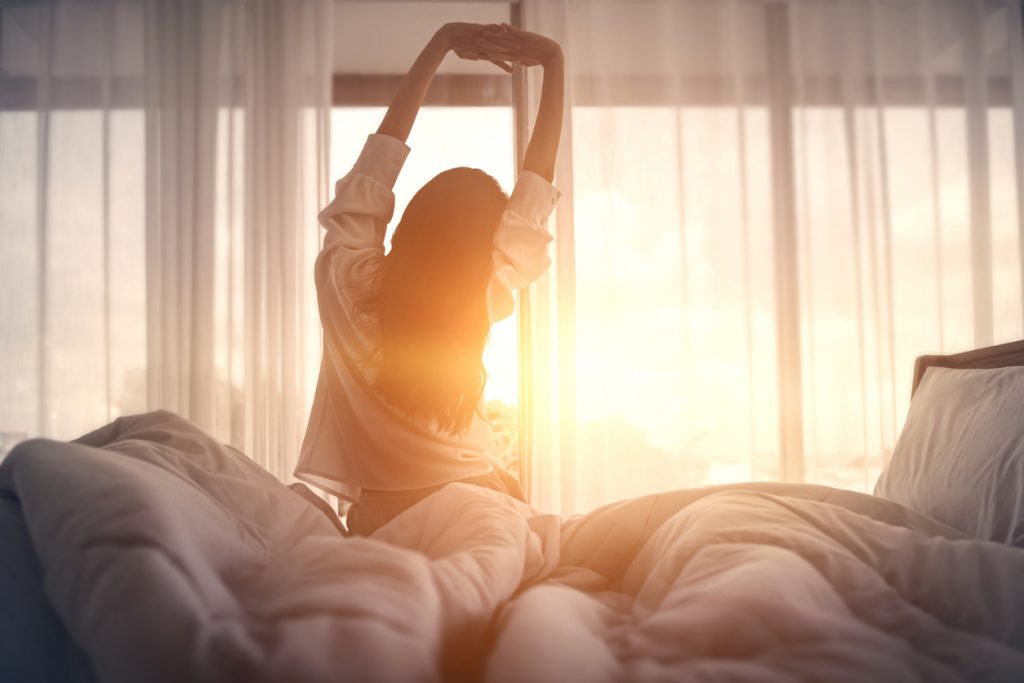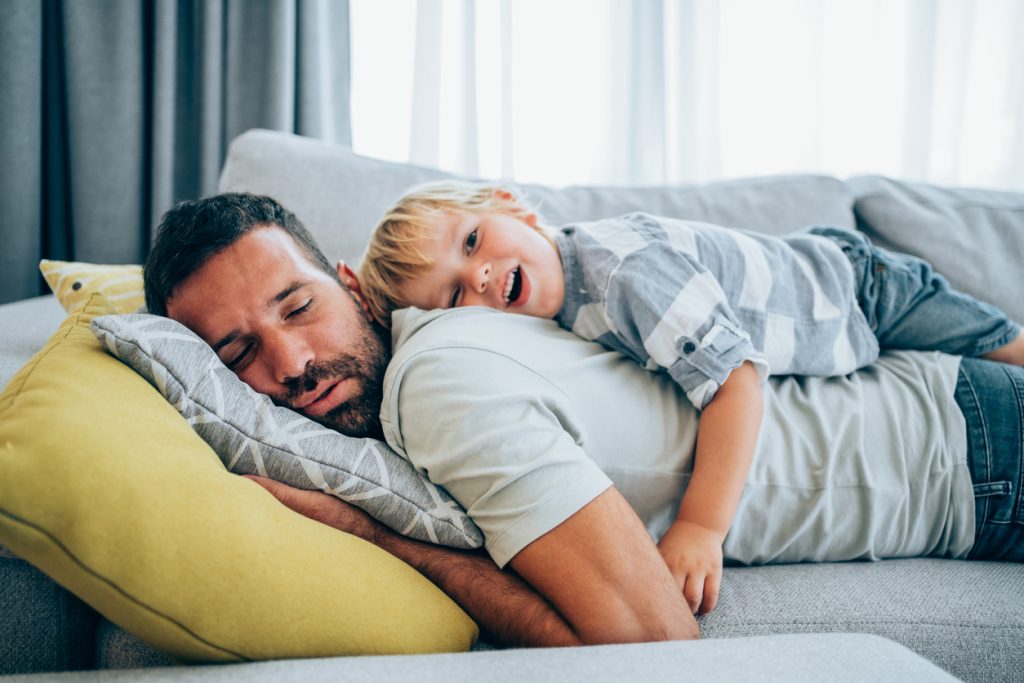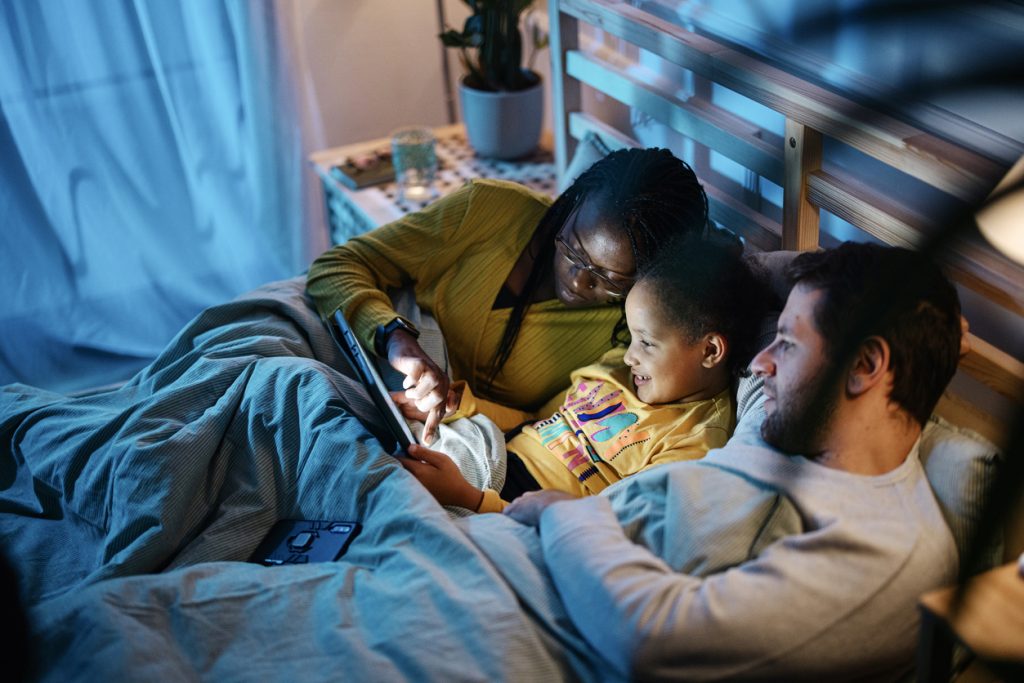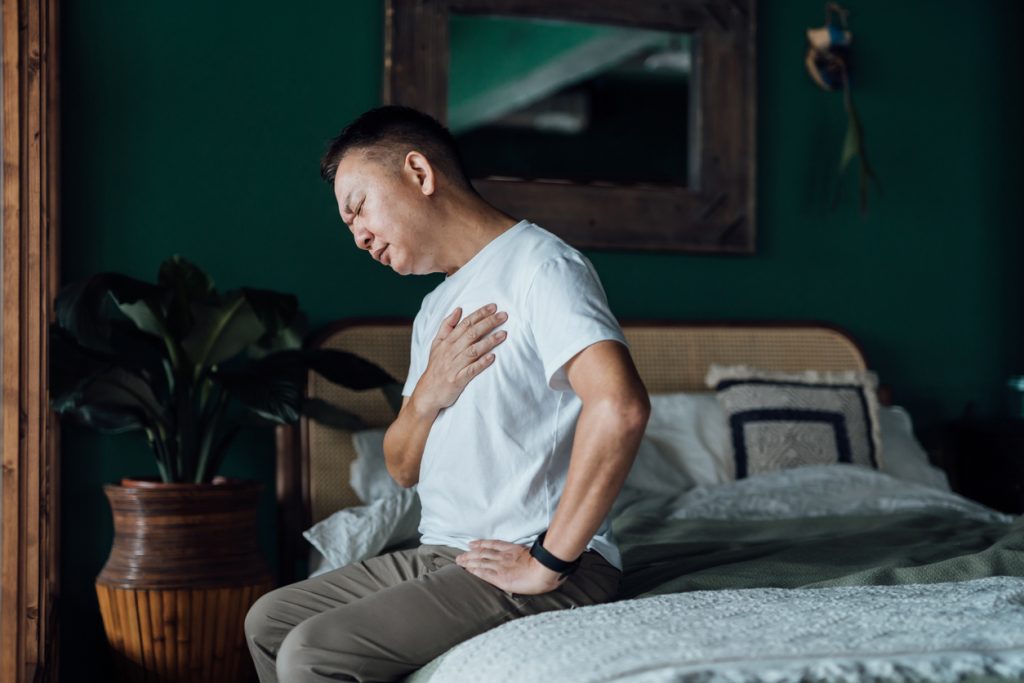Tips for better sleep: Sleep apnoea, bedtime routine & blue light
Our doctors are asked all the time for the tips for better sleep. Studies show that only 45 per cent of us are satisfied with the amount and quality of sleep we’re getting, while as few as 20 per cent are sleeping through the night uninterrupted.
Sleep is essential at any age, and is just as important as regular exercise and a healthy diet. It powers the mind, restores the body and fortifies virtually every system in your body. Getting good sleep can help you eat less, exercise better and get healthier.
Conversely, a lack of sleep can impact you both physically and psychologically, messing up your hormones, exercise performance and brain function, and leading to weight gain and increased risk of disease.
The good news is that there are ways to improve your quality of sleep to ensure you’re sufficiently rested.

What are the stages of sleep?
While many people have heard of REM sleep, there are actually four more stages to any sleep pattern. They are:
- Wake
- N1: Light sleep
- N2: Deeper sleep
- N3: Deepest non-REM sleep
- REM: Associated with dreaming, and is not a restful sleep stage.
Stages N1 to N3 are non-rapid eye movement (NREM) sleep, with each stage a progressively deeper sleep. Most of our sleep is spent in these stages.
How much sleep do we need each day?
The short answer is – it depends, on factors like your overall health, daily activities, sleep patterns, whether you’re pregnant and your age. Here is a guide according to the Sleep Foundation.
| Age | Recommended (hrs) |
| 0 – 3 months | 14 – 17 |
| 4 – 11 months | 12 – 15 |
| 1 – 2 years | 11 – 14 |
| 3 – 5 years | 10 – 13 |
| 6 – 13 years | 9 – 11 |
| 14 – 17 years | 8 – 10 |
| 18 – 25 years | 7 – 9 |
| 26 – 64 years | 7 – 9 |
| 65 years+ | 7 – 8 |
It doesn’t matter what age you are, sleep is important for our immune system. It’s especially important for babies and young children, who still have immature immune systems that need time to develop.
Pregnant women may find that their sleep isn’t as deep and refreshing as usual, and that they wake more often during the night. Additional sleep is often required.

How to sleep better
There are a number of evidence-based ways to improve your quality of sleep, including:
Create a sleep-inducing bedroom
- Think of your bedroom as a cocoon: a welcoming space where you can minimise external noise and light, as well as artificial light from devices like alarm clocks and smartphones.
- Declutter your bedroom. Having a clean room can help you relax.
- Set your bedroom temperature. Body and bedroom temperature can also profoundly affect sleep quality.
- Invest in a comfy bed, good-quality mattress, linens and pillows.
- Introduce pleasant aromas. Essential oils with natural aromas, such as lavender, can provide a soothing and fresh smell for your bedroom.
- Lower the lights. Avoiding bright light can help you transition to bedtime and contribute to your body’s production of melatonin.
Create a bedtime routine
- Reduce your blue light exposure at night. Blue light – which electronic devices like smartphones and computers emit in large amounts – impacts your circadian rhythm (24-hour internal clock) and tricks your brain into thinking it’s still daytime. Make an effort to turn off all devices an hour before bed.
- Try to sleep and wake at consistent times.
- Avoid eating late at night as it can impact the natural release of sleep hormones and melatonin.
- Avoid liquids before bed. Excessive urination during the night can affect sleep quality.
- Relax and clear your mind in the evening. Try meditation, light stretching, reading and listening to soothing music. Plus avoid distractions, like answering emails or playing on your phone.
- Take a hot bath or shower before bed.
Create pro-sleep habits during the day
- Increase your bright light exposure during the day. Natural sunlight or bright light during the day helps keep your circadian rhythm healthy.
- Avoid caffeine late in the day. It stimulates your nervous system and may stop your body from naturally relaxing at night.
- Reduce irregular or long daytime naps, as they can confuse your internal clock and make it difficult to sleep at night.
- Avoid alcohol, which is known to cause or increase the symptoms of sleep apnoea, snoring and disrupted sleep patterns.
- Exercise regularly, but not before bed as exercise increases alertness and hormones like epinephrine and adrenaline.

What happens if you don’t get enough sleep?
Not getting enough sleep can take a serious toll on your mental, physical and emotional health.
How do you know if you’re not getting enough sleep?
If you’re not getting enough sleep, you might:
- Feel tired, irritable and fatigued during the day.
- Lack motivation in your work, school or home life.
- Have difficulty focusing or remembering things.
- Feel less interested in sex.
- Find it difficult to get out of bed in the morning.
- Find it difficult to stay awake or concentrate in meetings, warm rooms, while driving or commuting, or after a heavy meal.
- Have impaired judgement, coordination and reaction times.
- Have to take a nap during the day.
- Crave sugar and caffeine.
- Fall asleep on the couch in the evening.
- Fall asleep within five minutes of going to bed.
- Need to sleep late on weekends.
- Be moody and irritable more than usual.
- Be more prone to colds or infections due to a weakened immune system.
What impact does a lack of sleep have?
In the short-term, a lack of sleep can impact your:
- Relationships. Increased anger and moodiness can trigger arguments. Sleep deprivation can also decrease your sex drive.
- Quality of life. You may find it difficult to participate in normal daily activities, like going to work, socialising and exercising.
- Appearance. Lack of sleep can lead to weight gain and premature skin ageing, including wrinkles and dark circles under your eyes.
In the long-term, sleep deprivation can have serious implications by:
- Increasing the likelihood of serious accidents, including car crashes.
- Increasing the risk of health issues, including stroke, diabetes, heart disease, certain cancers, high blood pressure, heart attack, heart failure or stroke.
- Increasing the risk of obesity and associated health issues.
- Increasing the risk of anxiety, stress and depression.
- Reducing immune system function.
- Increasing the likelihood of serious accidents, including car crashes, due to drowsiness or impaired judgement.
If you are experiencing symptoms, you should speak to a doctor to find out the right treatment for you. You can request a telehealth consultation with one of our Australian-registered doctors from anywhere in Australia, seven days a week.

What happens if you get too much sleep?
Oversleeping – which is defined as an adult sleeping more than nine hours in a 24-hour period – can happen for many reasons.
You might oversleep because you’re fighting off an illness, or are catching up after a few nights of deprivation. But if you find yourself consistently oversleeping, it could be a sign of a sleep disorder, mental health disorder or another health issue, including diabetes and heart disease.
What causes sleep apnoea?
Sleep apnoea is a sleep-related breathing disorder. While there are different types of sleep apnoea, the most common form occurs because your throat muscles relax too much during sleep. This causes you to stop breathing momentarily, and as a result you snore and choke during the night, then feel sleepy during the day.
It’s estimated that around 5 per cent of Australians suffer from sleep apnoea at some point in their life.
Contributing factors to sleep apnoea include:
- Being overweight or obese. Studies show the higher your BMI, the more likely you are to suffer from sleep apnoea.
- Age. The risk of suffering from sleep apnoea increases with age.
- Alcohol consumption and other drugs including cigarette smoking.
- Certain illnesses, like reduced thyroid production or goitres.
- Large tonsils and adenoids or an overbite, particularly in children.
- Certain medications.
- Nasal congestion and obstruction.
The good news is that sleep apnoea is a very treatable condition, beginning with losing weight, cutting back on your alcohol consumption and quitting smoking.
If you are experiencing symptoms, you should speak to a doctor to find out the right treatment for you. You can request a telehealth consultation with one of our Australian-registered doctors from anywhere in Australia, seven days a week.
To speak with an InstantScripts Doctor:
Request a ConsultationIf you have run out of your script:
Request a ScriptThis article is written by Natasha Dragun, who has been writing about health and wellness for more than 20 years.
© InstantScripts
Level 8 / 637 Flinders St.,
Docklands VIC 3008

